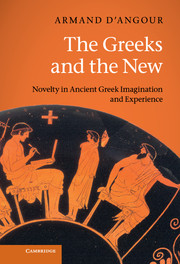Book contents
- Frontmatter
- Contents
- Acknowledgements
- Introduction
- Chapter 1 New, new, new
- Chapter 2 Loosening the grip of the past
- Chapter 3 The transformations of Kaineus
- Chapter 4 Old and new
- Chapter 5 Nothing new under the sun
- Chapter 6 The birth of Athena
- Chapter 7 Inventions of Eris
- Chapter 8 The newest song
- Chapter 9 Constructions of novelty
- Chapter 10 So what's new?
- References
- General index
- Index of Greek terms
- Index locorum
- References
Chapter 9 - Constructions of novelty
Published online by Cambridge University Press: 07 September 2011
- Frontmatter
- Contents
- Acknowledgements
- Introduction
- Chapter 1 New, new, new
- Chapter 2 Loosening the grip of the past
- Chapter 3 The transformations of Kaineus
- Chapter 4 Old and new
- Chapter 5 Nothing new under the sun
- Chapter 6 The birth of Athena
- Chapter 7 Inventions of Eris
- Chapter 8 The newest song
- Chapter 9 Constructions of novelty
- Chapter 10 So what's new?
- References
- General index
- Index of Greek terms
- Index locorum
- References
Summary
Make it new.
Ezra PoundA recurrent theme of the foregoing chapters has been the way that the processes and products of writing and literary composition are implicated with the Greeks’ constructions of novelty. Words are not simply neutral tools that symbolise an external reality. By articulating varied social expectations and viewpoints, discourses incorporate unspoken assumptions and create varied versions of the world. Consequently, one might suppose that nothing is good or bad – or new or old – but thinking and speaking make it so. The beginnings of critical understanding of discourse (logos) along these lines is evident in the relativistic doctrines of early sophists such as Protagoras and Prodikos, whose thinking influenced tragedy and comedy, Herodotean and Thucydidean historiography, rhetorical theory and medical treatises. Within their different contexts, these writings indicate a clear recognition that new understandings of words, and new ways of manipulating them, offer a perhaps uniquely productive means for generating innovation.
Greek literature exhibits varying degrees of self-consciousness about doing something new in word and thought. The Greeks not only innovated by creating a literature of extraordinary range and depth, but the development of their literary forms constantly gave them new forms and models for innovation. Within these new forms, the creation of new literary texts, whether in prose or verse, invariably exploits more or less deliberate mechanisms of innovation – improvisation, imitation, criticism, variation, reversal and so on. Words themselves illustrate a regular principle of innovation, in the way they recombine sounds and symbols that are part of a finite series to form wholly different phonemic and lexical units. Poetry and prose demonstrate multiple ways in which existing elements of this kind – formulae, themes and images, as well as words – may be combined to produce something new. Out of such elements are created scenes, narratives and histories. Each verse or sentence of an epic poem, lyric song or prose history opens up new scenarios and new possibilities for readers or hearers to perceive, imagine and ponder. Written texts are supremely versatile and effective vehicles for exhibiting and provoking varieties of novelty.
- Type
- Chapter
- Information
- The Greeks and the NewNovelty in Ancient Greek Imagination and Experience, pp. 207 - 224Publisher: Cambridge University PressPrint publication year: 2011



